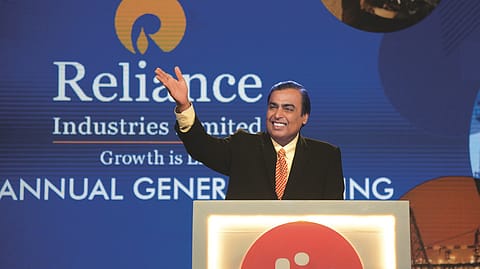RIL Q4 net profit rises 17%
Posts better-than-expected earnings in the January-March quarter, with robust petrochemicals, digital and retail earnings offsetting weakness in the refining business.

Reliance Industries Ltd (RIL) chairman Mukesh Ambani has consistently maintained over the last few years that expanding into consumer-facing businesses like retail and digital services will be the best way forward for the conglomerate he helms, despite some critics pointing out that the ostensibly unrelated diversification into these businesses may not bode well for the company that has been built on the foundation of crude refining, petrochemicals and oil and gas exploration.
As RIL announced its earnings for the fourth quarter and full year ended March 31, 2018, Ambani, India’s richest billionaire, has been proved right. RIL’s multi-pronged operating model has ensured that weakness in some of its businesses like refining and oil and gas exploration and production have failed to dent the company’s overall financial performance, which touched new highs in the January-March 2018 quarter.
RIL, India’s second most valued company with a market capitalisation of Rs 6.30 lakh crore, posted a 17.3% year-on-year rise in net profit to Rs 9,435 crore for the quarter ended March 31, 2018. Its turnover in the same period rose 39% to touch Rs 1.29 lakh crore. On a sequential basis, turnover was up 17.5% and net profit remained flat.
For the full financial year 2017-18, RIL’s net profit soared 20.6% to Rs 36,075 crore, while its revenues were up 30.5% to Rs 4.30 lakh crore. The net profit and revenues reported by the company surpassed street expectations. A Bloomberg poll of analysts expected RIL to report a net profit of Rs 9,347 crore in the fourth quarter, on a turnover of Rs 1.16 lakh crore.
“FY2017-18 was a landmark year for Reliance where we established several records on both operating and financial parameters. Reliance has become the first Indian company to record PBDIT (profit before depreciation, interest and tax) of over $10 billion with each of our key businesses-- refining, petrochemicals, retail and digital services achieving recording earnings performance,” Ambani said in a statement on Friday after market hours. “Substantial synergies, productivity gains, and production growth in our energy and materials business has allowed us to perform at very competitive levels despite the uptrend in oil prices through the year.”
The growth in earnings in the last quarter of fiscal 2017-18 was led primarily by RIL’s petrochemicals, digital and retail businesses. RIL’s petrochemicals business reported a turnover of Rs 38,113 crore, up almost 44% over the year earlier and earnings before interest and tax (Ebit) from the business rose 87% to Rs 6,435 crore. The petrochemicals business benefited from “strong volume growth, higher margins for polypropylene, downstream polyester products and fibre intermediate products,” the company said in its earnings statement.
“We expect the refinery off-gas cracker to have run at full capacity. This would be the first quarter to reflect the full impact of all projects in the petrochemicals segment,” analyst Avadhoot Sabnis of foreign brokerage CGS-CIMB said in a report dated April 17. The off-gas cracker is a petrochemical unit at RIL’s Jamnagar facility that is designed to use the gas generated from RIL’s refining operations to produce petrochemical products, thereby aiding margins.
Recommended Stories
The other star performer among RIL’s business was its retail venture, through which it sells everything from electronic appliances and jewelry to grocery. The segment reported a turnover of Rs 24,183 crore, up 134% year-on-year. Ebit from the business grew almost fourfold to Rs 951 crore in the same period. “Reliance Retail has become the first Indian retailer to cross the $10 billion revenue milestone,” RIL said in its statement.
RIL’s much talked-about telecom and digital services business, which it operates under the Jio brand, also recorded an impressive performance in the January-March quarter and for the full year. Reliance Jio Infocomm recorded revenues of Rs 8,421 crore during the quarter, up 3.5% sequentially, and an Ebit of Rs 1,495 crore, up 3.8% in the same period (as RIL started reporting financial numbers for Jio only in FY2018, comparable numbers for the previous fiscal year aren’t available).
Most significantly, Jio reported a standalone net profit of Rs 510 crore in the March quarter, which is significant considering the fact that Jio is spending massively on acquiring customers by extending its bouquet of digital services at low tariffs.
The only disappointment in RIL’s earnings was on account of its refining business. Despite a 30% year-on-year increase in revenues to Rs 93,519 crore during the quarter on account of higher crude oil prices, Ebit from the segment declined 11% to Rs 5,607 crore. This was “largely on account of reduced crude throughput and adverse move in Brent-Dubai differentials (the difference between the price of Brent crude and Dubai crude),” RIL said.
(INR CR)
The company’s GRM (gross refining margin) --or the difference between the value of refined products sold and the cost of crude--came in at $11 per barrel during the January-March quarter, much below the $11.4-mark expected by analysts. RIL’s reported GRM enjoyed a premium of $4 compared to the regional benchmark Singapore GRM.
RIL’s share price has been rallying over the last few weeks and months and touched a 52-week high during trading on the bourses on Friday, before closing at Rs 994.75 per share on the BSE, up almost 2%. The bourse’s behcmark S&P BSE Sensex gained 0.74% on the same day to end at 34,969.70 points.